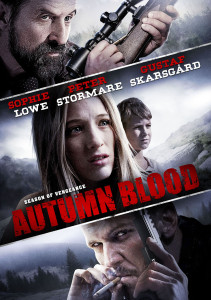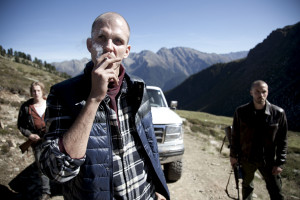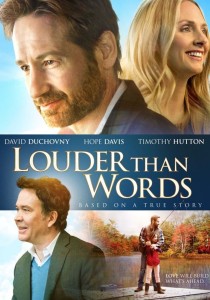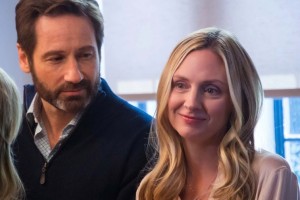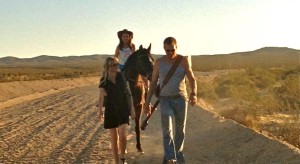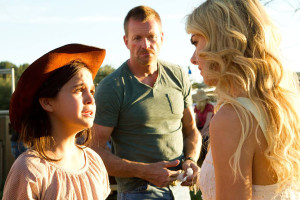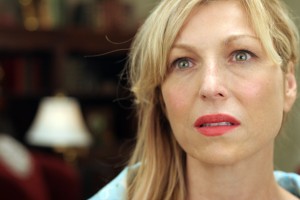(CLEOPATRA EENTERTAINMENT/SNOW LEOPARD ENTERTAINMENT/SANDALED KID PRODUCTIONS/JCB PICTURES/MULTIVERSE CINEMA (80 minutes; Unrated); 2022)

There are many reasons to watch a movie: we want to enjoy a riveting tale, we want to laugh, we want to be in suspense or get scared, or we want to enjoy our favorite stars strutting their stuff and portraying compelling character. I don’t know anyone who would knowingly choose to watch a movie about someone SUFFERING. But that is what you’ll be experiencing for the 80 minutes that comprise FROST, a nonetheless fascinating and challenging little flick from director Brandon Slagle. Let me just say upfront that actress Devanny Pinn, who plays a pregnant young woman named Abby in this movie, turns in one of the most insanely stressed-out performances ever filmed, and she deserves some sort of special award for her work here. Pinn is confined inside a crashed vehicle for nearly this entire movie, seriously injured and about to give birth, trapped on a mountainside with an approaching snowstorm. It’s a thankless, horrendous situation and no matter WHAT else a person might think about this movie, you have a major actress giving her all here. It’s cumulatively more and more jaw-dropping as the movie progresses. The simple plot is that Abby is visiting her partially estranged father Grant (Vernon Wells) somewhere out west, and over dinner we learn that he drinks too much for Abby’s taste, can be rude, and doesn’t do much of anything to impress her. And yet, he loves her, and they agree to go on a father-daughter fishing trip despite the forecast of a winter storm. Naturally, an inattentive moment causes Grant to veer off the road and crash into a tree, with one limb going straight through the windshield and into Abby’s chest. Jagged pieces of glass are everywhere, and the car is perched on the edge of a dropoff. Grant is able to squirm out of his seat, but if Abby tries to do the same, the car will plunge off the edge and kill her. And she can barely move or maneuver at all. So the plan is, Grant will seek help (the pair have walkie-talkies) and return to save Abby and her soon-to-be newborn. But she’ll have to tough it out in the ruined automobile, and try to stay warm as best she can before the weather worsens. A grim setup, for sure. What follows is one incident after another of Abby talking to herself, talking to her unborn, utilizing whatever still works on the car to her advantage, and trying to find something to eat, which in one revolting scene, includes sampling her dad’s nightcrawlers. Pinn is absolutely believable here, playing the role of a desperate, trapped woman hanging onto shreds of hope and constantly trying to reach her dad to get “progress reports.” She tries to treat one of her own injuries, not a pleasant scene to watch, and there is a remarkable scene involving a wolf who discovers her and has a motive that she must do everything she can to foil. It’s all very, very unsettling, and yes, it will test the patience of many viewers. You are seeing a woman suffer here. NOT being tortured or stalked like in standard horror movies. Just enduring a hopeless situation. And enduring And enduring. And enduring more…

It’s worth mentioning this film in terms of “horror movies,” because it’s mostly a wilderness adventure movie overall. Not all that realistic at times (I doubt most women would’ve made it as long as Abby given these circumstances). However, in the last ten minutes of the film, it does indeed turn to horror. I’m not going to say how, as that would spoil the “fun” for those of you who plan to see this. But I was genuinely shocked by the concluding section, as I did NOT see these events coming and literally could not believe what the filmmaker decided to show us. There are undoubtedly some viewers who will tune this film out before the final outrage, and that’s to be expected. But I give this film credit for NOT following the formula of this kind of scenario, and for deciding to make this’un a meditation on pure desperation rather than a conventional “rescue” situation. Just be warned, it is GRIM on every level. What we’re allowed to see of the scenery is kind of beautiful, and occasionally (but not always) the music is effective. And you gotta give writers James Cullen Bressack and Robert Thompson (screenplay) credit for crafting a small, personal largely one-character film and making it brutally realistic down to minute details. But… this is a fairly trying viewing experience. I take away from it two main things: that Devanny Pinn is a supremely ambitious and brave actress, one to watch for sure. And that some filmmakers like to set up one set of expectations and then “stick it to you” in the end. That’s certainly what they do in FROST, and sick as it is, I kinda admire them for it.













